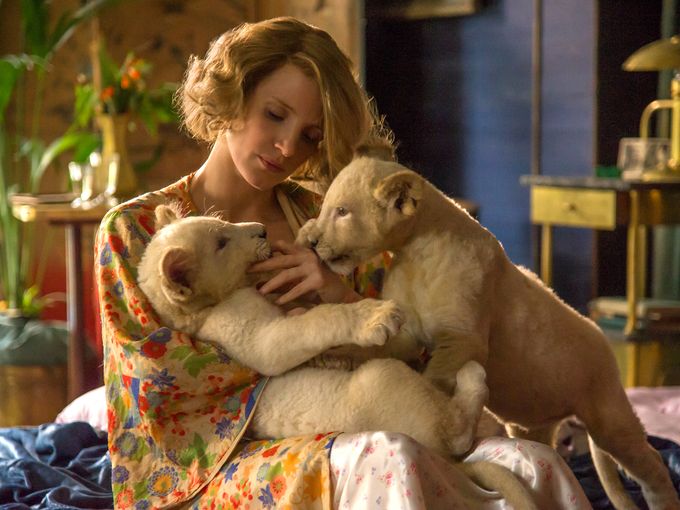
Dir: Niki Caro | Screenwriter: Angela Workman (based on the book by Diane Ackerman | Cast: Jessica Chastain, Johan Heldenbergh, Daniel Bruhl, Timothy Radford, Efrat Dor, Iddo Goldberg, Shira Haas, Michael McElhatton, Vad Maloku | 127min | Drama
The most poignant aspect of THE ZOOKEEPER’S WIFE is the non-human story. But sadly the animals concerned are not the main focus in this Holocaust tale about a woman who sheltered Jews in her Zoo in Warsaw. Niki Caro’s drama is a variation on the The Diary of Anne Frank with exotic beasts thrown in – and this time getting the short straw – most of them being slaughtered by the Germans during bomb raids over the Polish city. The commendable but controlled drama film is also a showcase for Jessica Chastain’s talents as Antonina a gentle Polish woman whose guile and courage helped save a group of Jews who were banished to the Warsaw ghetto towards the end of the Second World War and escaped with their lives.
THE ZOOKEEPER’S WIFE faces stiff competition with Polanski’s Warsaw epic The Pianist and Agnieszka Holland’s In Darkness, where a Polish World War Hero, Leopold Socha, hid a group of Jews. But the human element here is far less memorable than the story of the Zoo. Antonina Zabinska and her husband Jan , sheltered 300 Polish Jews at the Warsaw Zoo during World War II. The story opens cosily in the balmy summer of 1939 with Chastain waking her son and two lion cubs that share the family home. Her husband is a Prof and together they’ve nurtured the Zoo and its impressive menagerie of animals and are now basking in the afterglow of their hard work, blessed with a young son Ryszard (Timothy Radford) and an active sex life. The characterisation is all rather predictable. Prof is a masculine protector (The Broken Circle Breakdown‘s Johan Heldenbergh, Chastain as Antonina exudes feminine wholesomeness from her bouncy curls to her curvaceous figure and rocks a rather good Polish accent. Then it all goes pear-shaped when Germany invades Poland. The Nazis are nasty and shouty and their commandant Lutz Heck (Daniel Bruhl)- who we first meet as a German zoologist from Berlin Zoo – rapidly turns callous at the outbreak of hostilities informing the couple that their Zoo is to be ‘liquidated’. The animals are then mostly shot or slaughtered – one of the worst scenes involves the shooting of an elephant and a prize golden eagle who Bruhl orders to be ‘stuffed and mounted’. It later appears in his private office as he announces his plans for a selective breeding programme. At this point Antonina uses her feminine wiles to persuade Heck to run their Zoo as a pig farm providing fodder for German soldiers. The pigs will be fed vegetable waste that Jan will collect daily from the Ghetto. But the two plan to secrete Jews onto his truck, hiding them under the litter.
Although awful things happen to the Jewish hostages here we remain mostly unaffected by their plight largely due to a lack of complexity. The underwritten characters are like cyphers so we fail to feel their pain – or their joy and Antonina and Jan Zabinski – despite their bravery – emerge as martyred victims rather than shining heroes. Adapting Diane Ackerman’s best-selling book, Caro and screenwriter Angela Workman portray their protagonists as endlessly virtuous saviours and the enemy as vicious and venal. The only flicker of naughtiness comes when Antonina willingly submits herself to Heck’s blandishments- to save her husband, Jewish friends and cherished Zoo.
As Holocaust film go this is a safe bet, yet also a unexpected tear-jerker. It has cuddly bunny scenes (where the CGI is barely distinguishable) and cuddly conjugal scenes showing how men very much had the traditional upper hand in wartime. DoP Andrij Parekh camerawork is skilful and Daniel Bruhl breaks out of his usual buttoned-up roles in a scene of surprising passion which adds to his repertoire and his allure. The most disappointing aspect here is tragically the human story. MT
NOW ON GENERAL RELEASE FROM 21 APRIL 2017